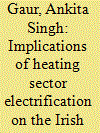| Srl | Item |
| 1 |
ID:
186496


|
|
|
|
|
| Summary/Abstract |
Electrifying the heating sector, which is energy and carbon intensive, and shifting electricity supply to renewable technologies is one of the main policy options being pursued for decarbonisation of the heating sector. Heat pumps are widely adopted for this purpose. However, the impact of this policy on existing electrical systems, both from the perspectives of supply and demand, is understudied in the literature. This paper examines the system-wide impacts of integrating high quantities of heat pumps, in line with government targets, in Ireland. We provide a broad discussion of the ramifications of heating sector electrification in terms of system costs and expansion planning under renewable energy targets. Results reveal significant changes in generation and increases in associated costs with increasing levels of electrification. On the flip side, the heating sector electrification leads to more efficient utilisation of renewable energy and the transmission network. We also explore alternative policy pathways to minimize impacts on the system. These include determining optimal locations for heat pump integration and a technology-neutral emission reduction target. Optimal distribution of heat pumps has a low impact on system metrics whereas pursuing an emission reduction target makes a large impact on system costs.
|
|
|
|
|
|
|
|
|
|
|
|
|
|
|
|
| 2 |
ID:
109420


|
|
|
|
|
| Publication |
2011.
|
| Summary/Abstract |
We examine how state-level factors affect greenhouse gas (GHG) reduction policy preference across the United States by analyzing climate action plans (CAPs) developed in 11 states and surveying the CAP advisory group members. This research offers insights into how states approach the problem of choosing emissions-abatement options that maximize benefits and minimize costs, given their unique circumstances and the constellation of interest groups with power to influence state policy. The state CAPs recommended ten popular GHG reduction strategies to accomplish approximately 90% of emissions reductions, but they recommended these popular strategies in different proportions: a strategy that is heavily relied on in one state's overall portfolio may play a negligible role in another state. This suggests that any national policy to limit GHG emissions should encompass these key strategies, but with flexibility to allow states to balance their implementation for the state's unique geographic, economic, and political circumstances. Survey results strongly support the conclusion that decisions regarding GHG reductions are influenced by the mix of actors at the table. Risk perception is associated with job type for all strategies, and physical and/or geographic factors may underlie the varying reliance on certain GHG reduction strategies across states.
|
|
|
|
|
|
|
|
|
|
|
|
|
|
|
|